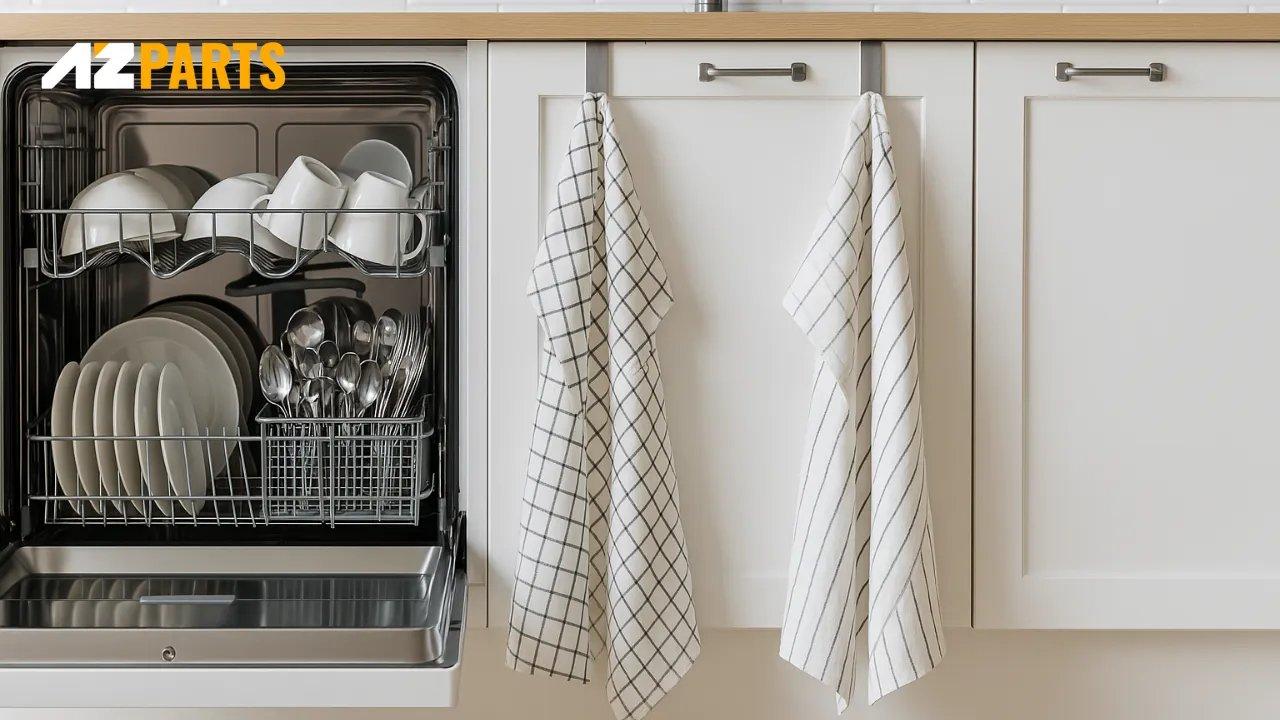How-To Guides
Dishwasher Is Making a Buzzing Noise and How to Fix It
AZparts Team
Updated on December 28, 2025
11 min read
A dishwasher is a great time-saver, but if it suddenly starts making unusual noises like buzzing, squealing, rattling, or grinding, it could be a sign that something is wrong. Don’t ignore these sounds, they may indicate issues with internal components. In this article, AZParts will help you identify the causes and provide effective solutions to get your dishwasher running smoothly again.

Key Takeaways
- A dishwasher making a buzzing noise often points to water flow issues, loose hoses, or failing pumps.
- Different sounds signal different problems, from clogged spray arms to worn circulation or drain pumps.
- Regular cleaning and checking for obstructions can help reduce noise and prevent bigger repairs.
- If the noise persists or gets louder, replacing worn parts with compatible components is often the best fix.
- For electrical or pump-related issues, professional service is the safest solution.
1. Reasons Your Dishwasher Is Making Noises
1.1. Buzzing
Buzzing is one of the most common noises users hear while using a dishwasher. The primary cause of buzzing usually relates to the water supply and drainage system. Specifically, accessories such as water hoses, fittings, or connectors between hoses may be loose, clogged, or improperly installed, causing irregular water flow that results in prolonged buzzing sounds. Additionally, if the dishwasher is installed close to a wall or other hard surfaces without any sound insulation, vibrations from water flow or the motor can also create a buzzing effect.
In this case, you should inspect the dishwasher’s water hose fittings to ensure they are securely installed, free from cracks, leaks, or damage. If replacement is needed, you can consider the Dishwasher Hose Fitting Parts from AZParts to find the correct parts compatible with your device.
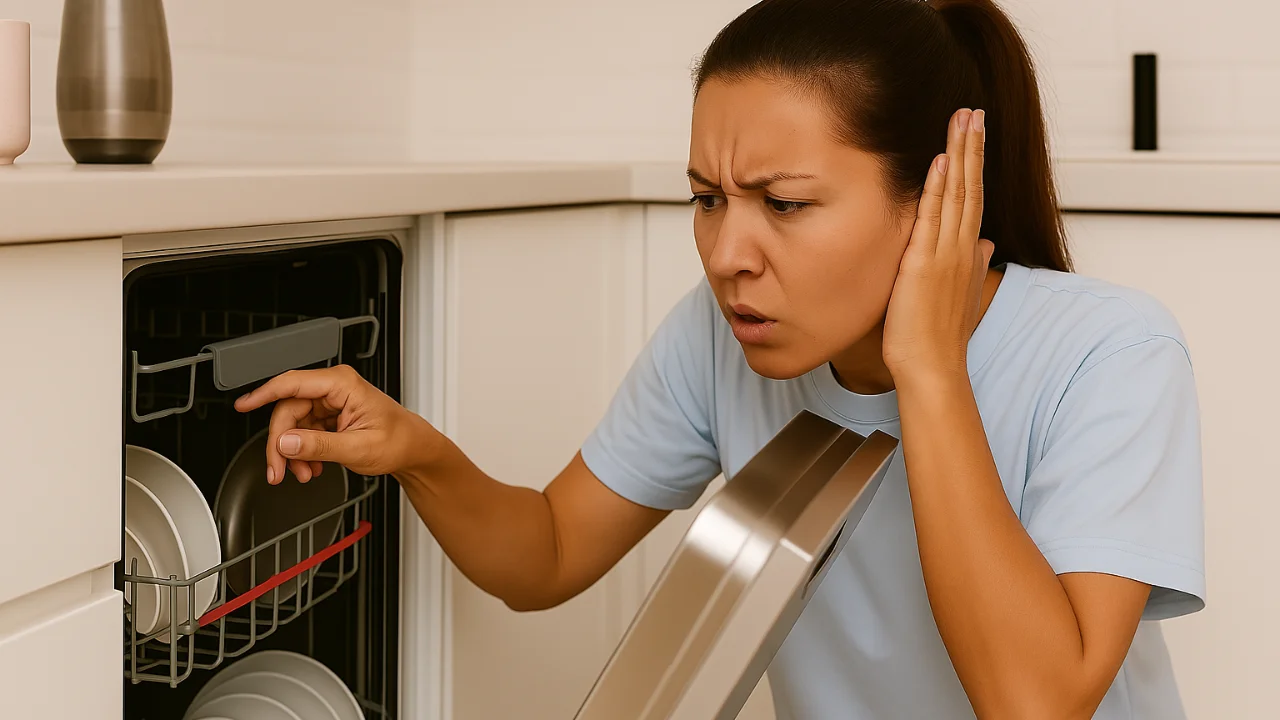
Should inspect the dishwasher’s water hose fittings to ensure they are securely installed (Source: AZParts)
1.2. Beeping
Beeping is generally not a mechanical fault but an electronic alert from the dishwasher system. This sound often occurs when there is an issue during operation, such as the door not being fully closed, low water level, water leakage, or interruption of the washing cycle. The machine may also beep to signal the end of a wash cycle or to indicate a technical error (with error codes displayed on the control panel). Carefully reading the user manual or checking specific error codes will help identify the exact cause of the beeping sound.
1.3. Grinding
If the dishwasher produces a grinding noise, it is likely that the spray arm inside is misaligned, stuck, or colliding with utensils in the washing compartment. When rotating, if the spray arm is obstructed or does not spin smoothly, it will create sounds like metal or plastic grinding. Another possible cause is food debris or foreign objects trapped inside the rotating mechanism.
Regular cleaning and inspection of the spray arm are essential to ensure stable operation. If the part is damaged or excessively worn, it is advisable to replace it with a Spray Arm from AZParts to maintain optimal washing performance.

Regular cleaning and inspection of the spray arm are essential to ensure stable operation (Source: AZParts)
1.4. Squealing
Squealing sounds usually come from the motor or water pump running unevenly, which can be caused by lack of lubrication, worn bearings, or foreign objects obstructing rotation. Squealing may also indicate the pump is deteriorating and requires inspection or replacement. If the squealing is accompanied by reduced washing performance or unusually long operating times, it is very likely that the motor or pump has serious issues.
To fix this, you should check the pump and motor of your dishwasher. AZParts offers genuine replacement parts compatible with many dishwasher models, helping you effectively resolve this problem.
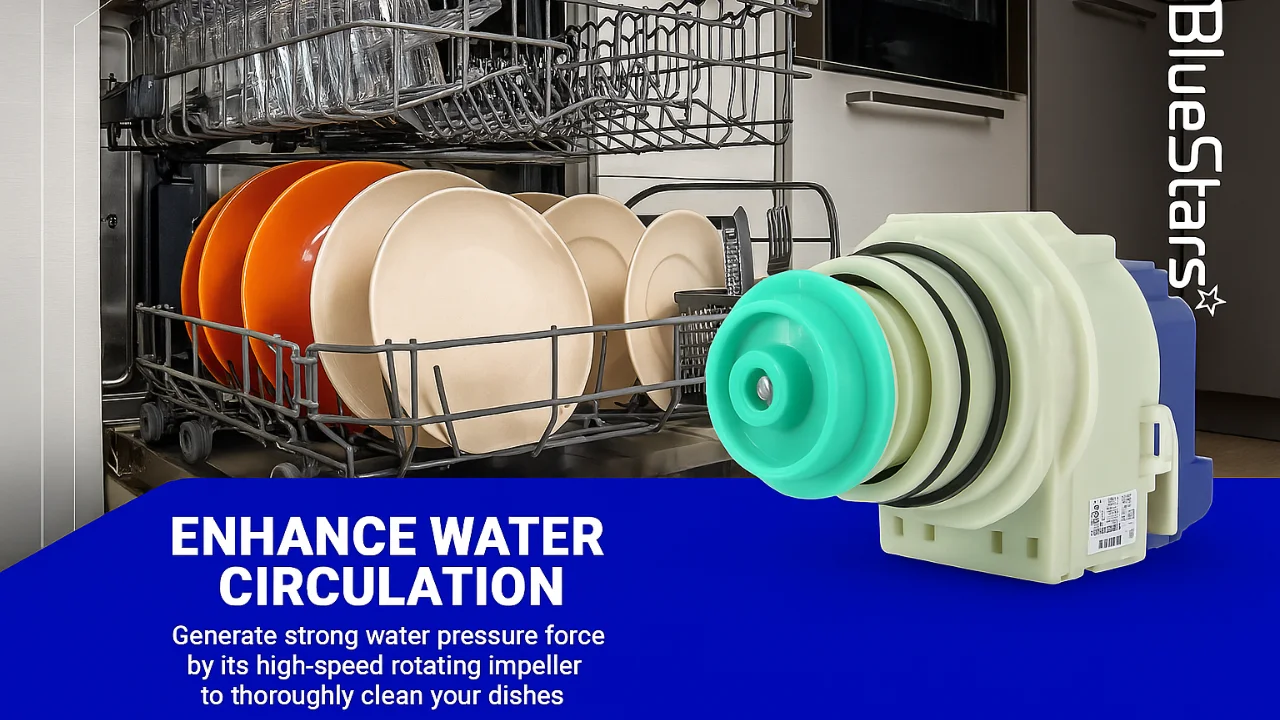
AZParts offers genuine replacement parts compatible with many dishwasher models (Source: AZParts)
1.5. Rattling
Rattling often occurs because items inside the dishwasher are improperly placed, causing them to collide during operation. Small, lightweight objects like cup lids, cutlery, or thin glassware can easily shake and create noise. Additionally, some internal parts such as racks, support bars, or water trays that are loose may also cause similar sounds. To fix this, arrange your dishes securely and ensure all internal components are correctly installed in their positions.
1.6. Thumping
Thumping sounds usually arise from high water pressure or vibrating water pipes during operation. When water enters or drains too quickly, pipes that are not properly secured can hit against walls or surrounding surfaces, producing loud thumping noises. Moreover, improper or unstable installation of the dishwasher can cause strong vibrations, resulting in thumping sounds during use.
To address this, inspect the water supply system, secure all pipes, and ensure the dishwasher is installed on a stable, level surface. You may also use soundproof materials or rubber pads to reduce vibrations and noise.
2. How a Faulty Circulator Pump Sounds in Your Dishwasher
The circulation pump is a crucial component that helps draw water up and evenly spray it throughout the washing cycle. When the pump is working properly, you will typically hear only the gentle sound of water flowing or a smooth rotating noise. However, if the circulation pump malfunctions, the dishwasher may produce unusual sounds, indicating that this part is damaged or worn out.
Below are some characteristic sounds that suggest the circulation pump is having problems:
- High-pitched squealing or screeching: This sound, similar to metal grinding or a dry screech, often indicates worn bearings inside the pump, lack of lubrication, or foreign objects stuck inside. If left untreated, the pump may burn out or stop working completely.
- Growling or strong vibration: A growling noise accompanied by strong vibrations may mean the impeller inside the pump is misaligned, broken, or rubbing against the pump casing. It could also be caused by foreign objects (such as bones, broken pieces of utensils, or food debris) obstructing the movement.
- Prolonged buzzing or a low humming sound: Continuous buzzing can occur if the pump motor is receiving power but cannot spin freely, usually due to a seized shaft, burnt coils, or a faulty start capacitor. This is a serious condition that requires immediate attention to prevent damage to other parts of the machine.
- No sound of water circulation: If you hear no water spraying or circulating during the wash cycle, it is possible the circulation pump has completely stopped working. Although the machine may still appear to operate normally (lights on, motor running), the cleaning effectiveness will be poor or there will be no water coming out of the spray arms.
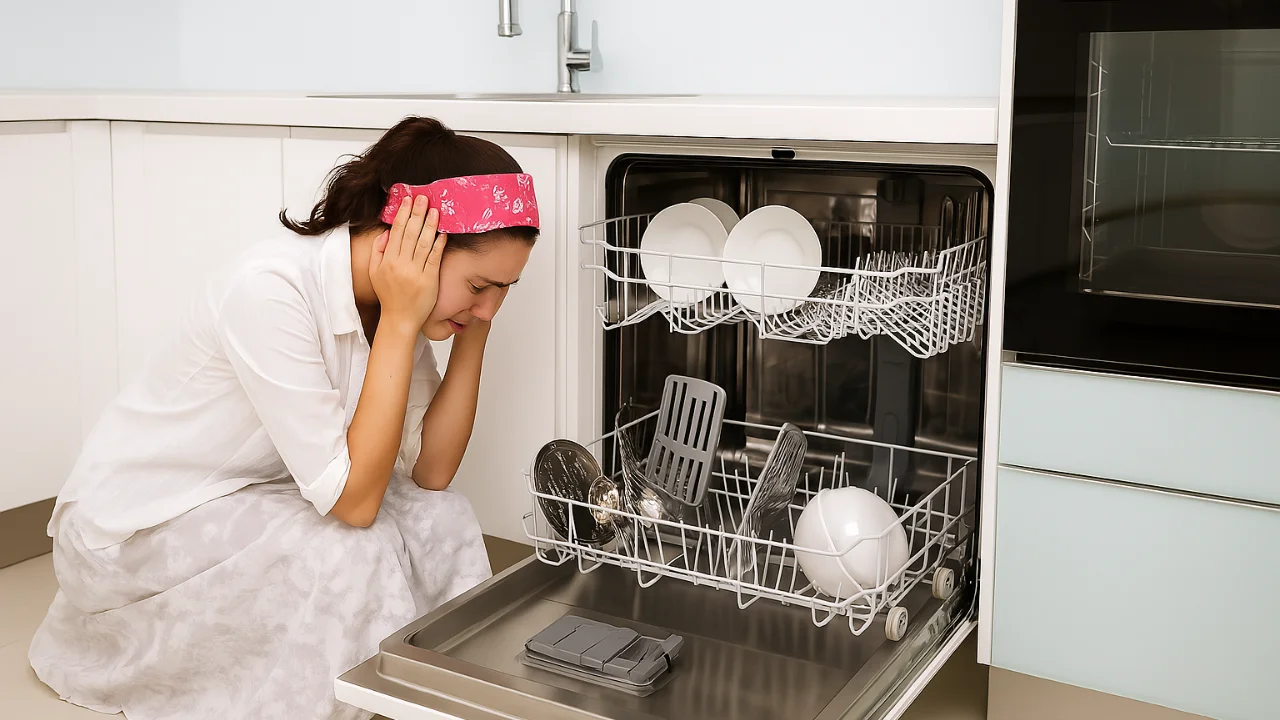
If the circulation pump malfunctions, the dishwasher may produce unusual sounds (Source: AZParts)
How to Fix It
- First, disconnect the power and check if any foreign objects are stuck inside the pump.
- If no obvious cause is found, the pump is likely faulty and needs replacement.
- You should use genuine circulation pumps from reputable suppliers such as AZParts to ensure compatibility and durability.
- If you lack experience with appliance repair, contact a professional technician for proper inspection and replacement.
Recognizing abnormal sounds from the circulation pump early will help you address issues promptly, prevent further damage, and ensure the dishwasher operates efficiently for a long time.
3. Noises That Indicate a Malfunctioning Drain Pump
The drain pump in a dishwasher is responsible for pumping out dirty water after each wash cycle through the drain hose. When the drain pump operates normally, you will hear a steady flow of water and a light, stable motor sound during draining. However, if the drain pump is faulty, the machine may emit unusual noises. Recognizing these sounds early helps detect problems and prevent more serious damage.
Below are common sounds that signal issues with the drain pump:
- Unusual squealing or grinding noises: A squealing or grinding noise occurring during the final stage of the wash cycle when the machine begins draining—can indicate the drain pump impeller is obstructed or worn out. Foreign objects such as broken glass, bones, or large food pieces may get stuck, causing the impeller to jam, wobble, or scrape against the pump housing, producing squealing sounds.
- Prolonged low humming noise: A steady, continuous humming without water flowing out suggests the drain pump motor is running but water is not being expelled. This often happens when: The drain hose is clogged or kinked; The dishwasher filter is blocked; The impeller is damaged or the pump is losing pressure.
- Clicking or knocking noises during draining: If you hear clicking or light knocking noises while the drain pump is running, it’s likely that hard objects like bottle caps, plastic pieces, or small stones have entered the pump. These objects rotate with the impeller and cause repeated knocking sounds. If not addressed promptly, this may break the impeller or damage the shaft.
- No sound during the draining phase: Another clear sign is when no sound is heard at all during the draining phase, and water remains pooled inside the dishwasher. This indicates the drain pump may be burnt out, completely broken, or the control system is not sending commands to the pump. In this case, the dishwasher often shows an error (flashing lights or an error code on the display).

If the drain pump is faulty, the machine may emit unusual noises (Source: Freepik)
How to Handle a Suspected Faulty Drain Pump:
- Turn off the power and open the filter cover to check for any obstructions.
- Inspect the drain hose to ensure it is not kinked, clogged, or blocked.
- If strange noises persist and water does not drain, you should remove the drain pump to inspect the impeller or replace the pump.
AZParts offers high-quality drain pumps compatible with many dishwasher models. When replacing, choosing genuine parts ensures optimal performance and long-lasting durability.
4. How to Fix and Prevent My Dishwasher From Making Noise?
When your dishwasher starts making unusual sounds such as humming, squealing, clicking, or grinding, it may indicate that some internal parts are malfunctioning. Early troubleshooting not only helps the appliance run more quietly but also extends its lifespan and improves washing performance. Below are useful methods to fix and prevent dishwasher noise issues.
4.1. Move the Dishwasher
One of the simplest causes of noise is an unstable or misaligned installation position. If the dishwasher is not placed securely, it may vibrate and produce loud noises, especially during water pumping or draining stages. How to do it:
- Check the adjustable feet and ensure the dishwasher sits firmly on a flat surface.
- If the machine is tilted, adjust the feet height to balance it properly.
- Make sure there are no foreign objects stuck between the dishwasher and surrounding walls or cabinets.
4.2. Clean the Chopper Blade
The chopper blade is responsible for grinding food debris into small pieces to prevent clogging the drain pipes. If this part gets dirty or blocked by foreign objects, it can cause unusual noises when the blade rotates.
How to do it:
- Turn off the power and water supply before starting.
- Remove the filter basket and access the chopper blade underneath.
- Use a soft brush or cloth to clean it thoroughly.
- If the blade is worn or broken, replace it with genuine parts from trusted suppliers like AZParts.
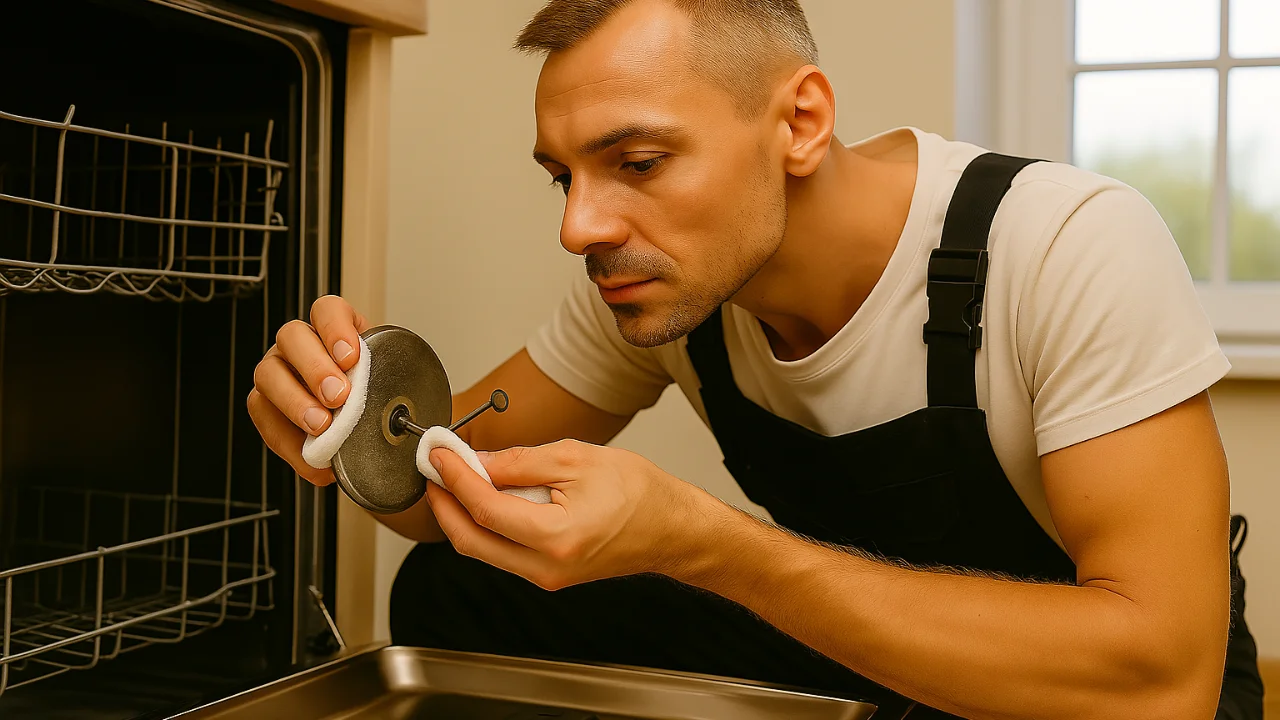
If the Chopper Blade gets dirty it can cause unusual noises when the blade rotates (Source: AZParts)
4.3. Replace the Pump
If the noise comes from the circulation pump or drain pump—especially humming, squealing, or growling sounds—it is likely that the pump is worn out, burnt, or malfunctioning. Timely pump replacement will restore smooth operation.
Replacement tips:
- Identify the correct pump type (circulation or drain pump).
- Purchase genuine, compatible parts for your dishwasher model.
- Consider authentic pumps, motors, and components from AZParts to ensure quality.
4.4. Call a Professional Technician
In many cases, users may lack the skills or tools to repair complex parts like motors, sensors, or control boards. Attempting self-repair can cause further damage or void the warranty.
When to call a technician:
- Basic troubleshooting steps don’t reduce the noise.
- The machine emits abnormal sounds accompanied by error codes.
- You are unfamiliar with disassembly or the noise source is unclear.
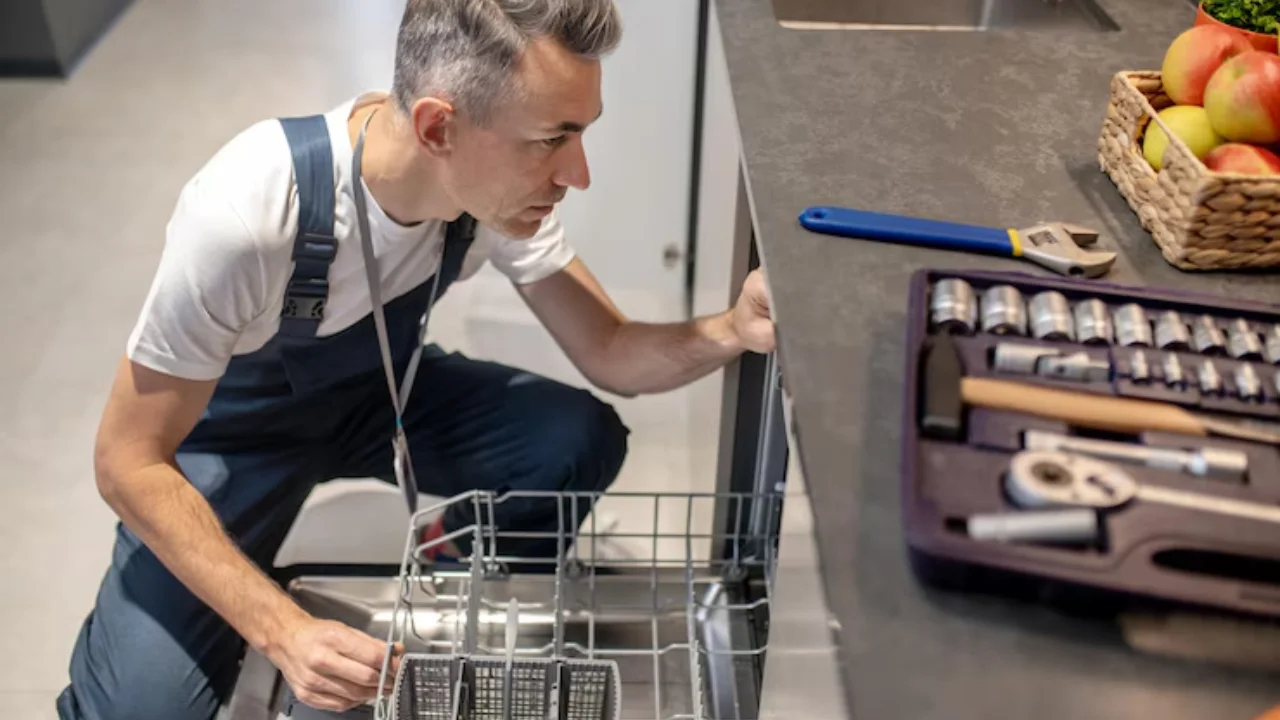
You should call a professional technician if facing serious damage (Source: Freepik)
Dishwasher noises do not always mean serious damage. However, timely observation and action can help you avoid major issues, save repair costs, and keep your dishwasher running quietly for longer. When replacing dishwasher parts, always choose genuine products like those from AZParts and contact reputable service centers for professional support.
Contact Info
Address: 8 The Green, Ste A, Dover, Delaware 19901-3618, United States
Email: support@azparts.com
Read more:
Dishwasher
Further Reading
Further Reading

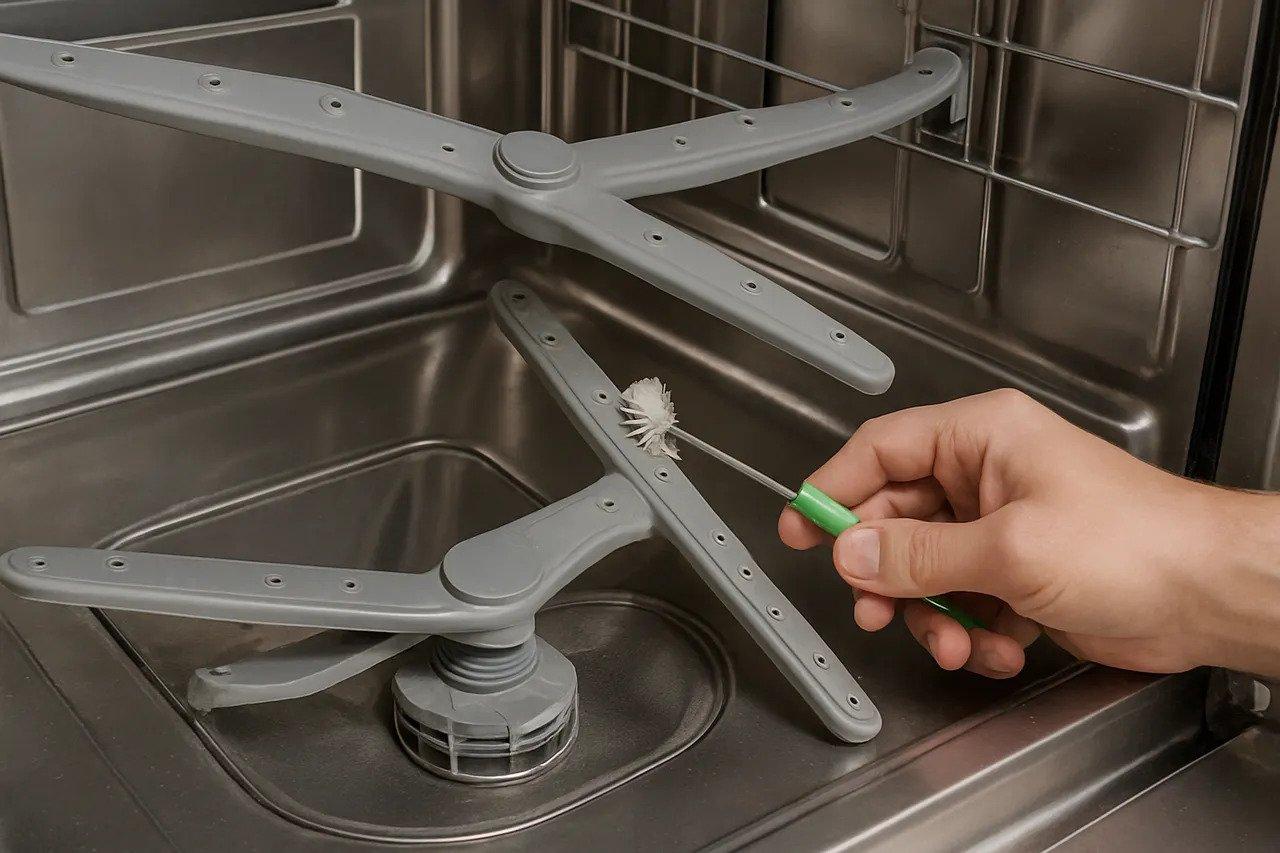

_1748246700.jpg&w=3840&q=75)

